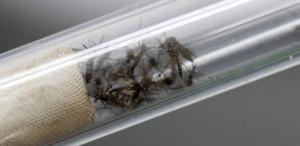Zika virusZika epidemic likely to burn itself out within three years
The current Zika epidemic in Latin America is likely to burn itself out within three years, suggests new research. The findings also conclude the epidemic cannot be contained with existing control measures. The researchers predict the next large-scale epidemic is unlikely to emerge for at least another ten years — although there is a possibility of smaller outbreaks in this time.

Research to develop a vaccine against Zika will continue // Source: theconversation.com
The current Zika epidemic in Latin America is likely to burn itself out within three years, suggests new research.
The findings, from scientists at Imperial College London, also conclude the epidemic cannot be contained with existing control measures. The team, who published their findings in the journal Science, predict the next large-scale epidemic is unlikely to emerge for at least another ten years — although there is a possibility of smaller outbreaks in this time.
Professor Neil Ferguson, lead author of the research from the School of Public Health at Imperial, explained: “This study uses all available data to provide an understanding of how the disease will unfold - and allows us to gauge the threat in the imminent future. Our analysis suggests that Zika spread is not containable, but that the epidemic will burn itself out within 2-3 years.”
ICL says that in the study, Ferguson and colleagues from the Medical Research Council Centre for Outbreak Analysis and Modelling at Imperial, collated all existing data for Zika transmission across Latin America. The team then used this information, alongside data on similar viruses such as dengue, to build a mathematical model to represent the current epidemic, and future waves of transmission.
Using this model, the team calculated the current epidemic would end within two to three years, due to the fact people are unlikely to be infected with Zika twice.
Ferguson explained: “The current explosive epidemic will burn itself out due to a phenomenon called herd immunity. Because the virus is unable to infect the same person twice - thanks to the immune system generating antibodies to kill it — the epidemic reaches a stage where there are too few people left to infect for transmission to be sustained.
“Using our model, we predict large-scale transmission will not restart for at least another ten years - until there is a new generation in the population who have not been exposed to the Zika virus. This mirrors other epidemics, such as chikungunia - a similar virus to Zika — where we have seen explosive epidemics followed by long periods with few new cases.”
